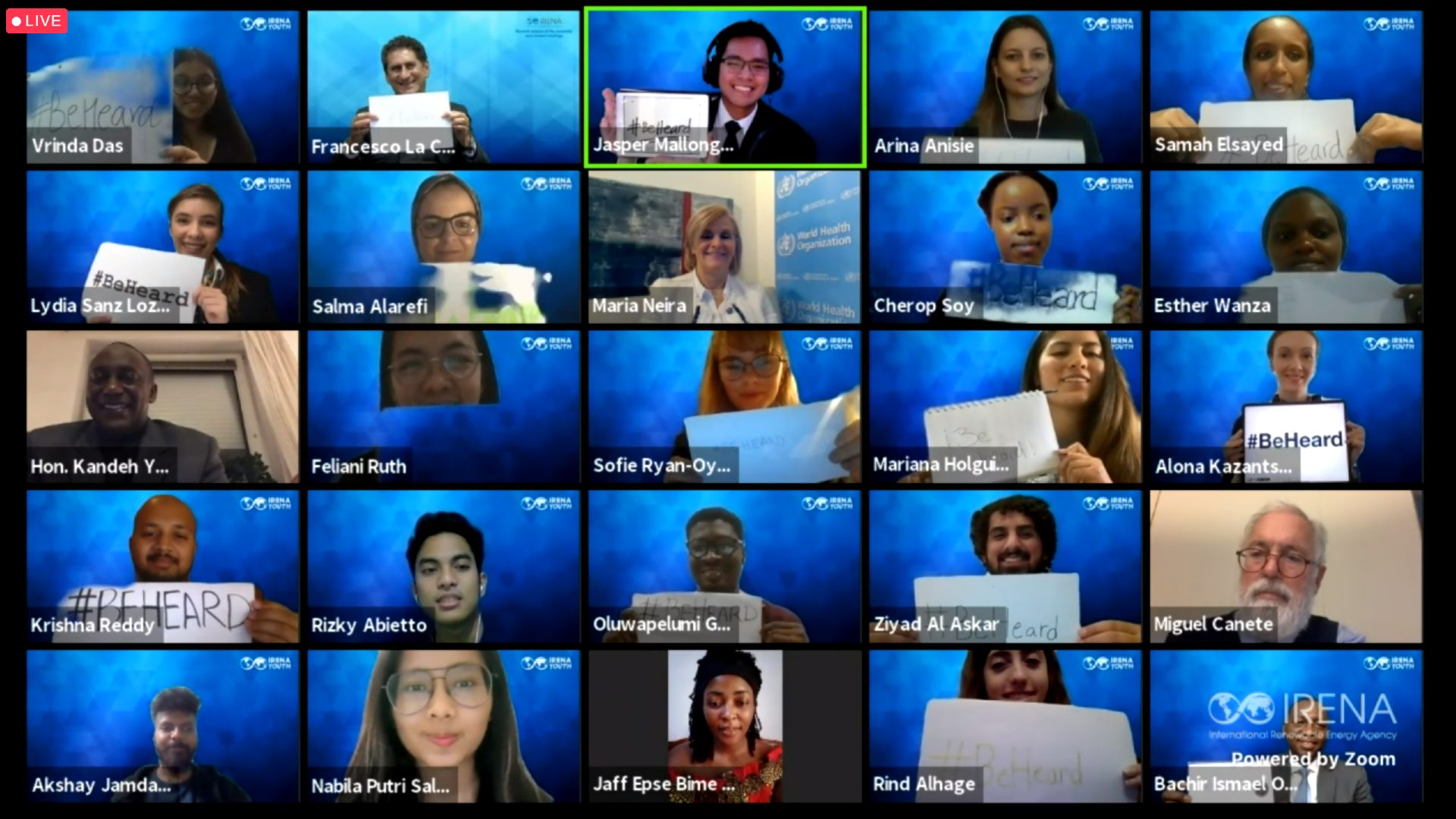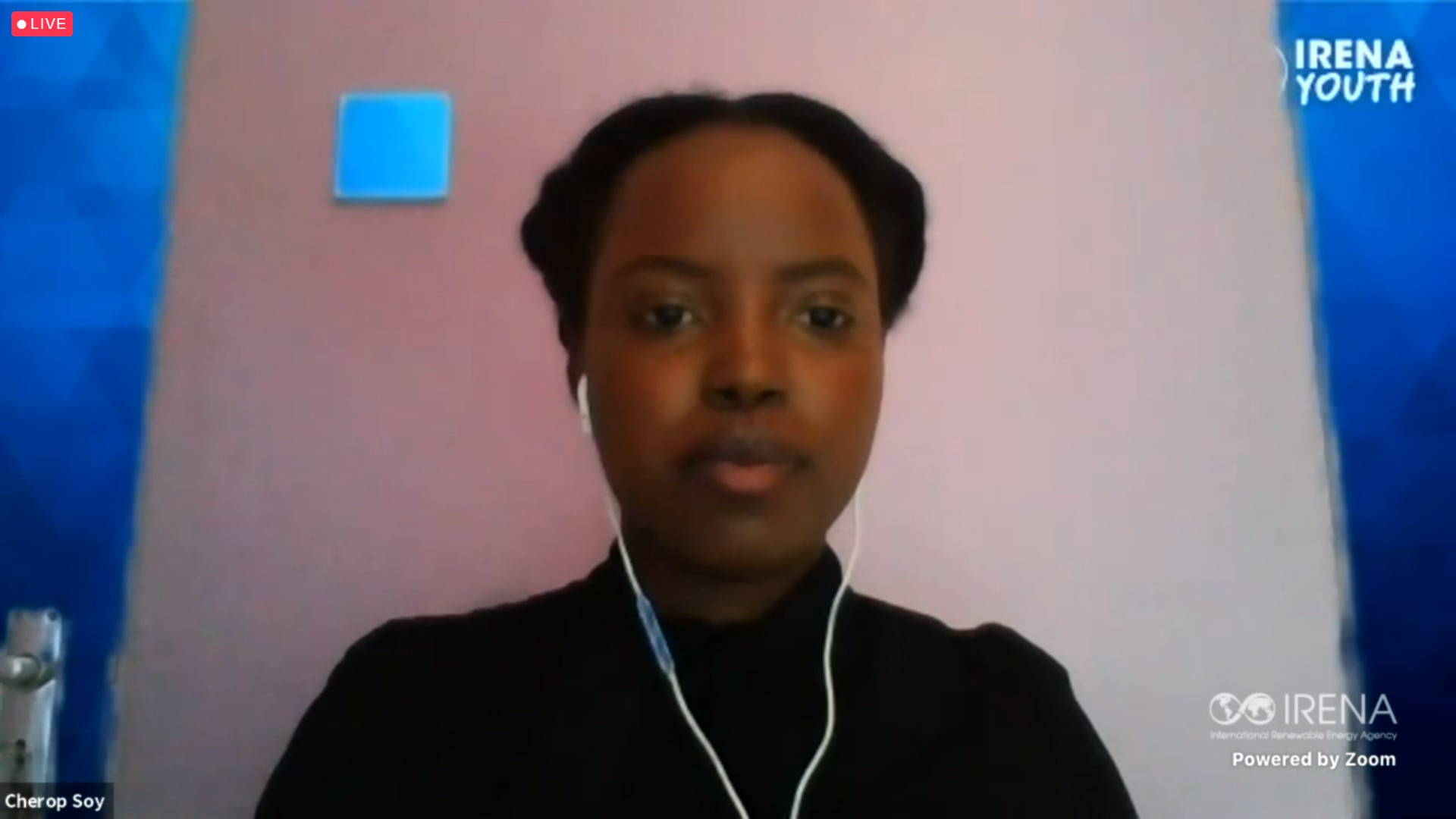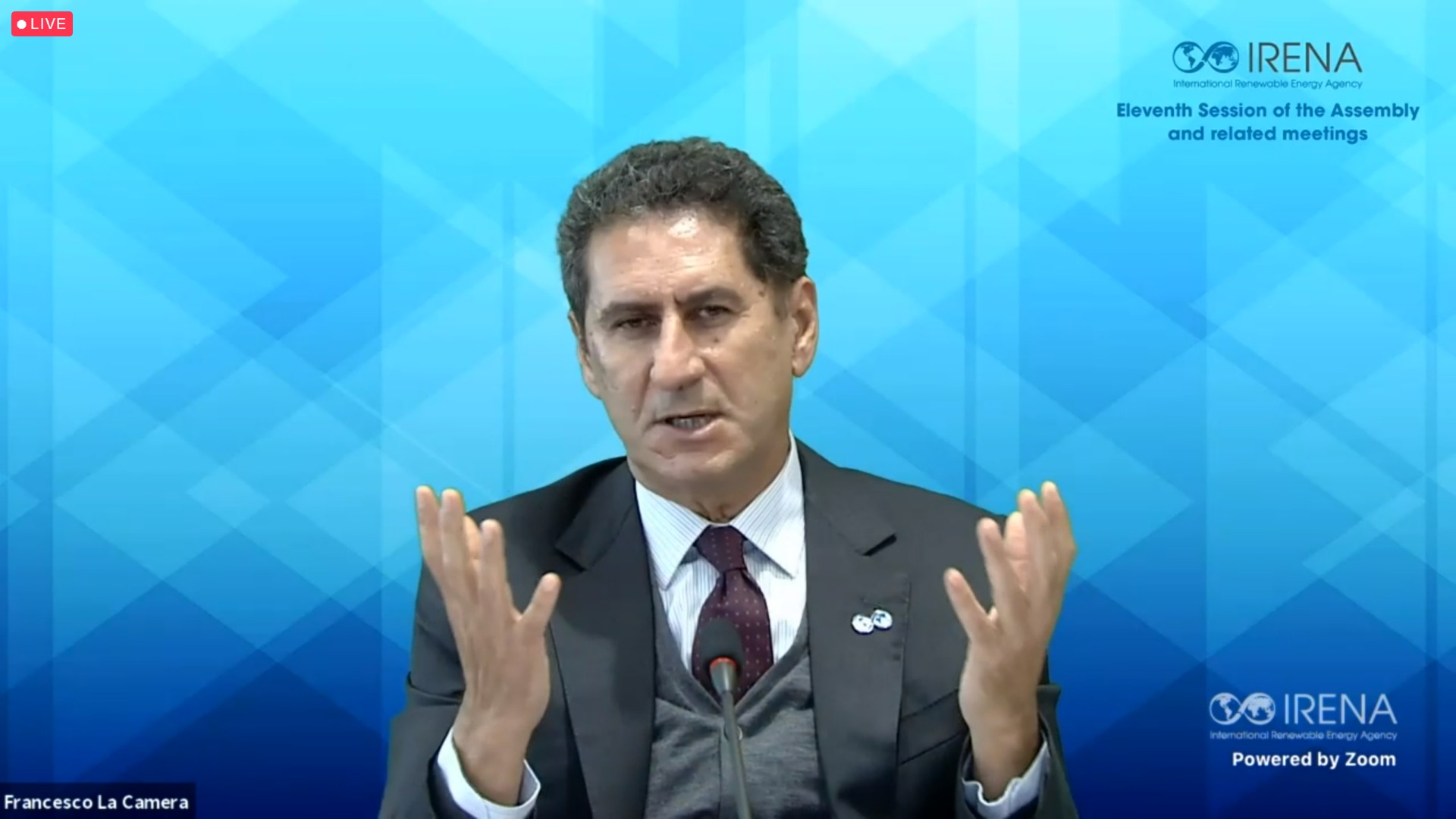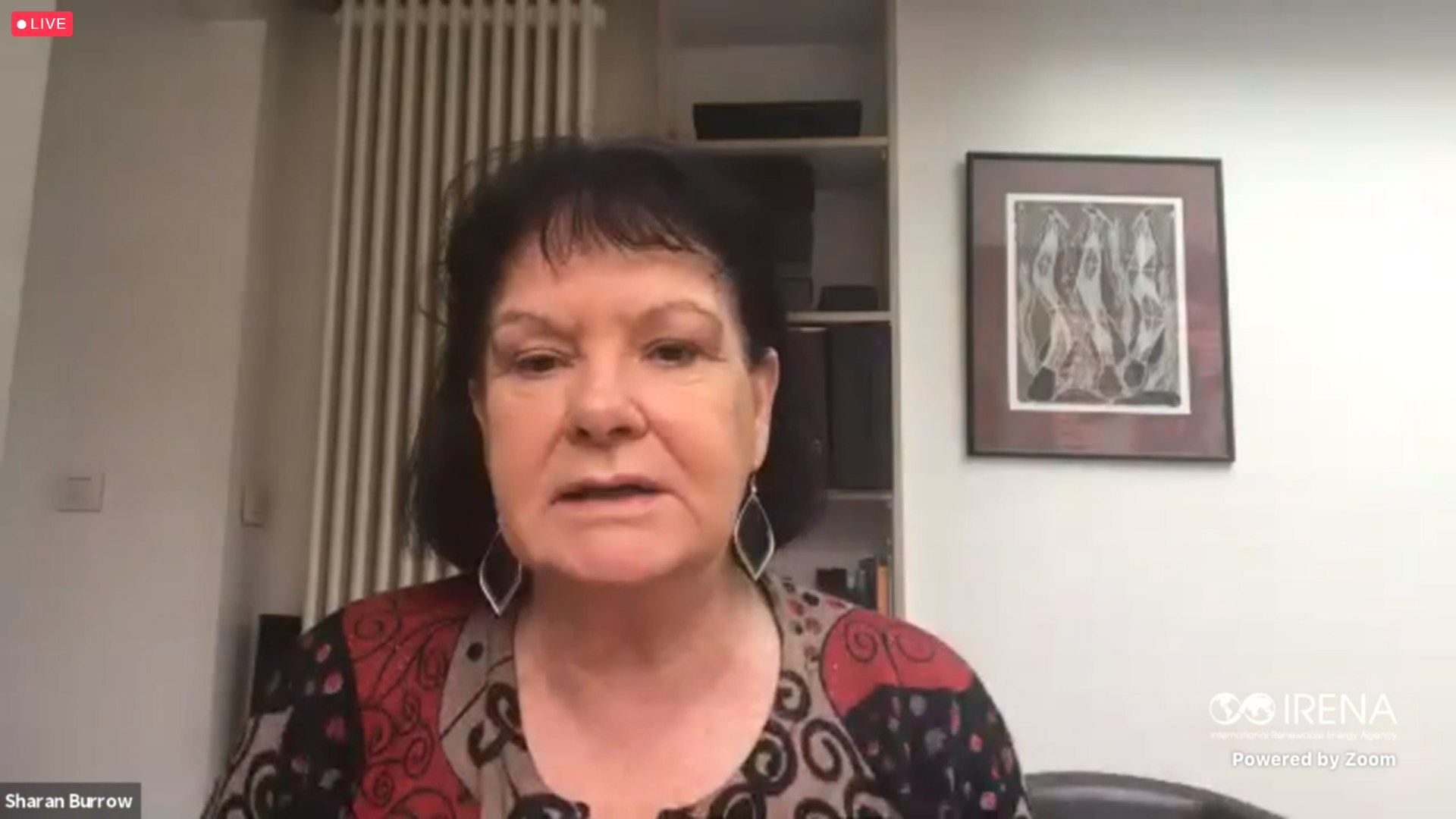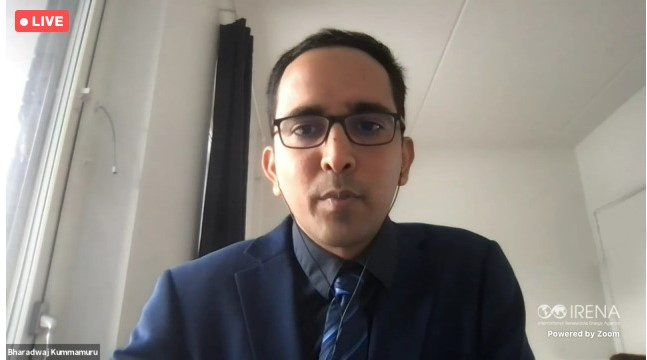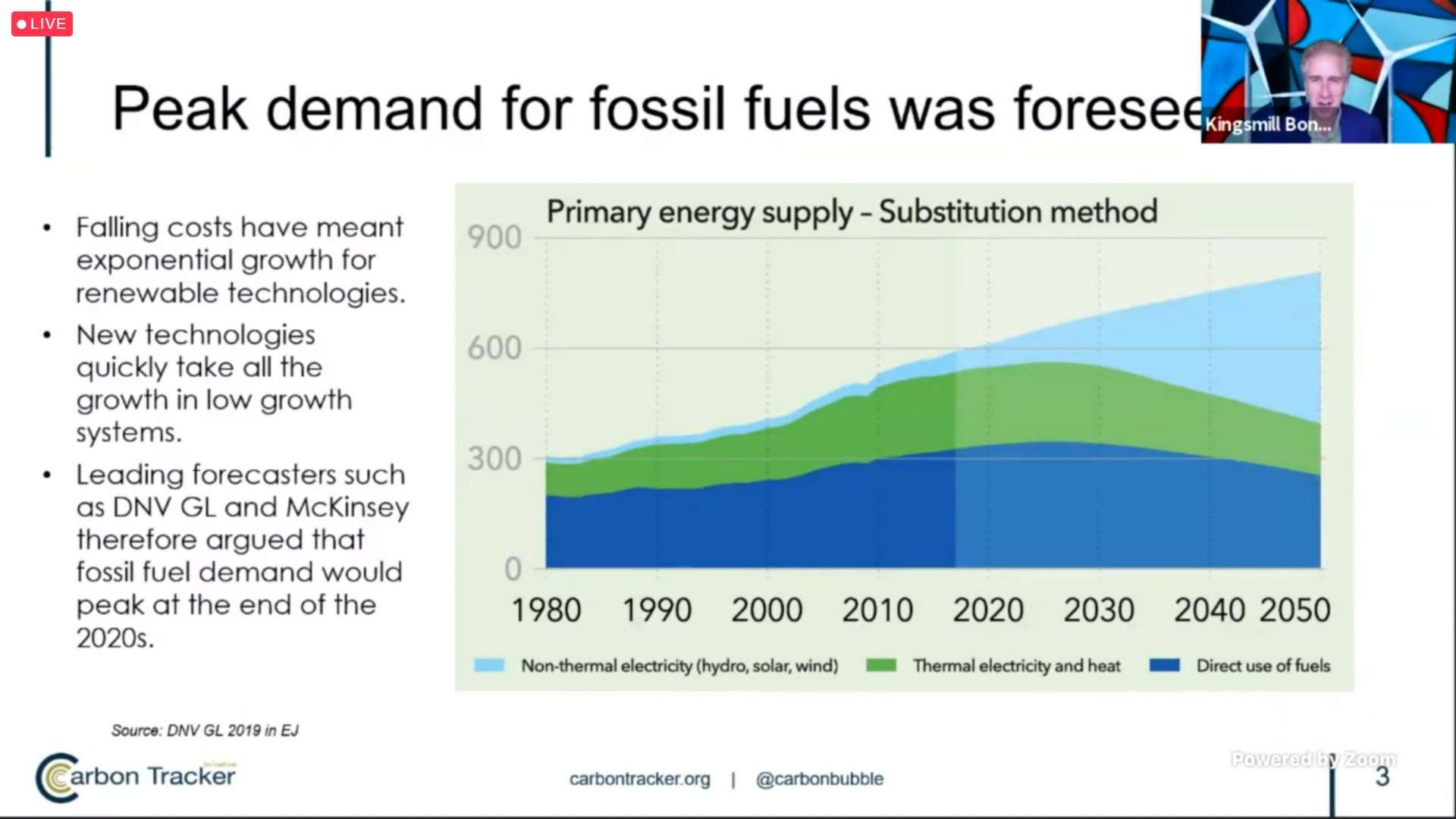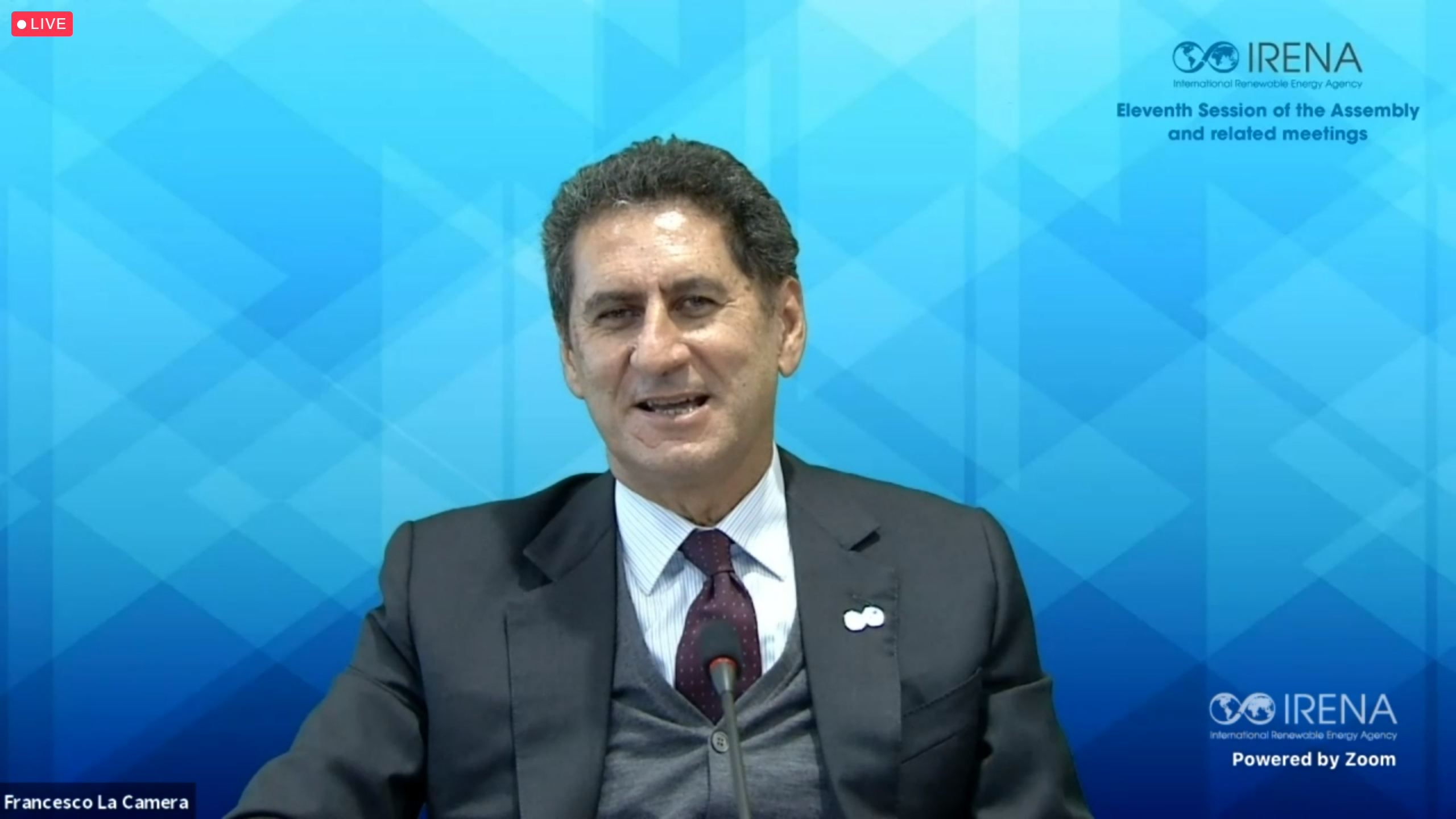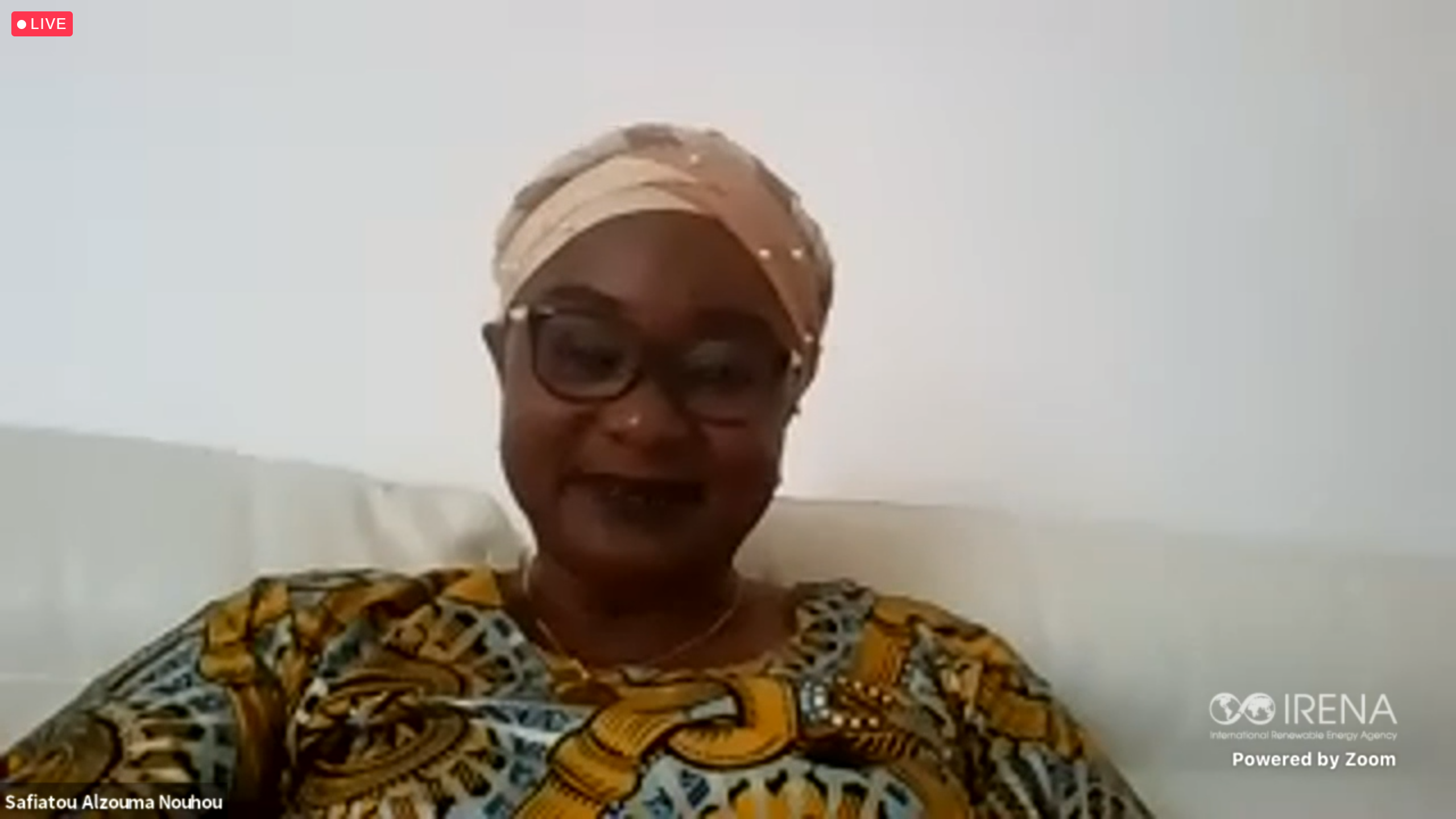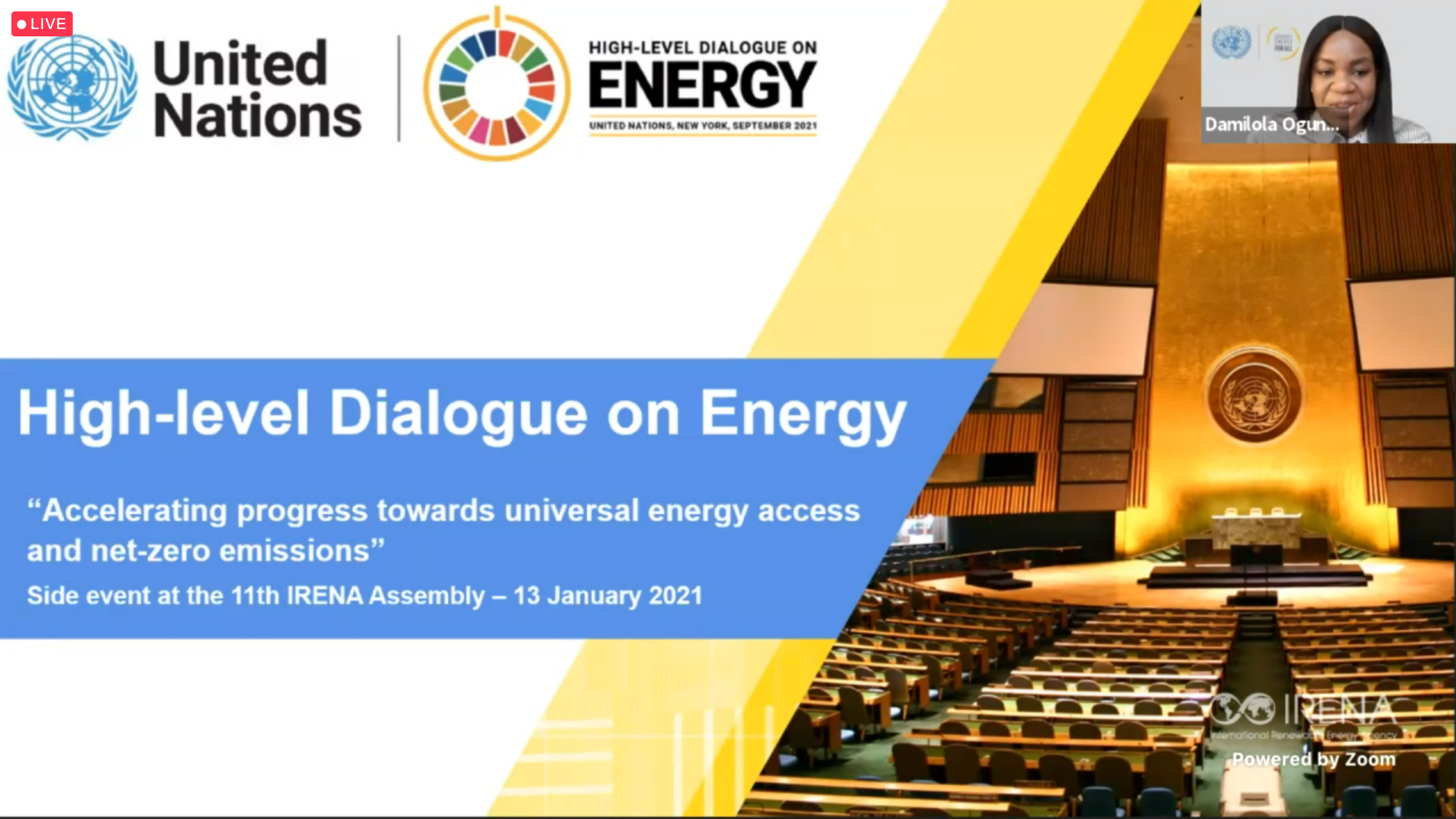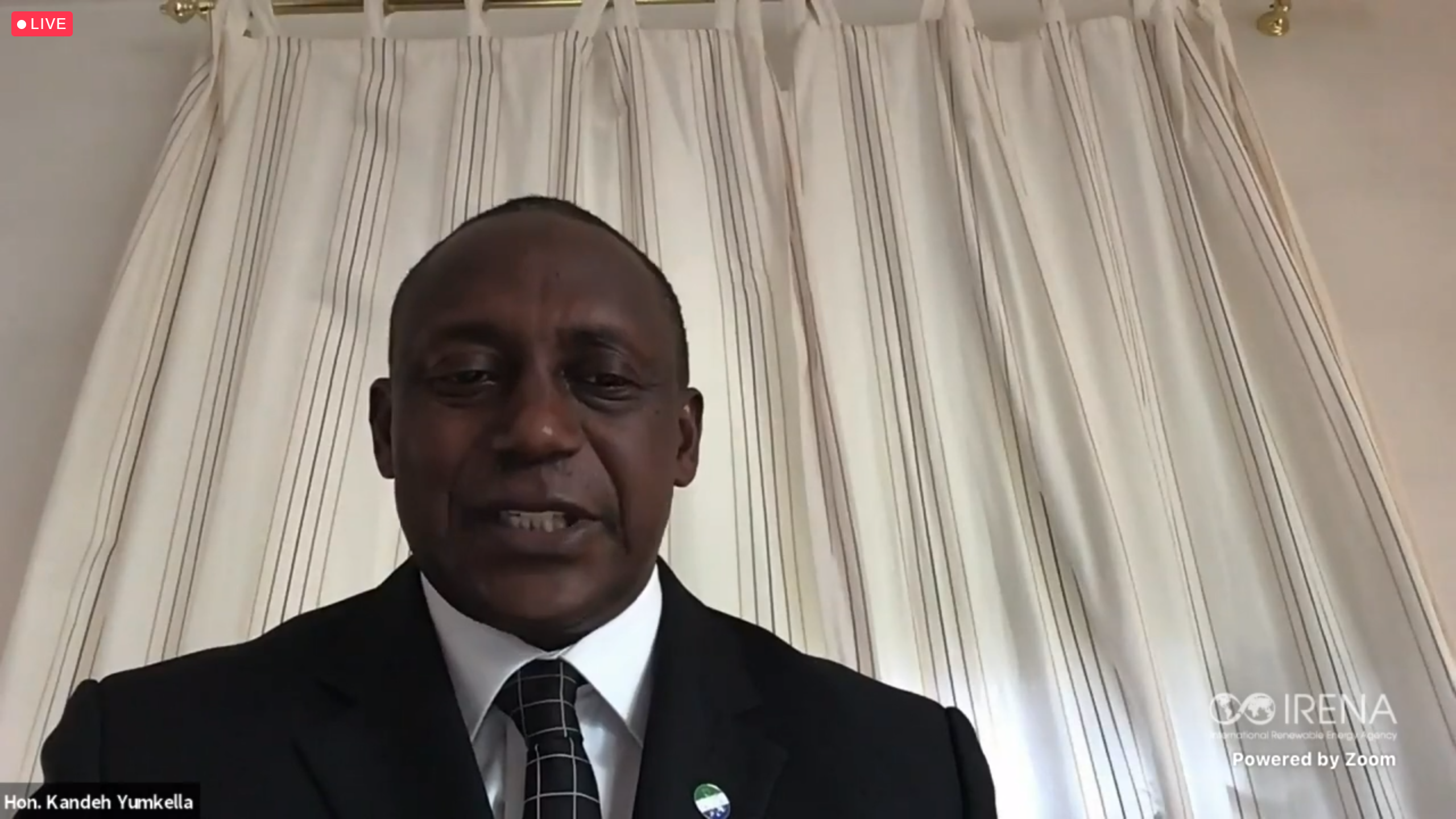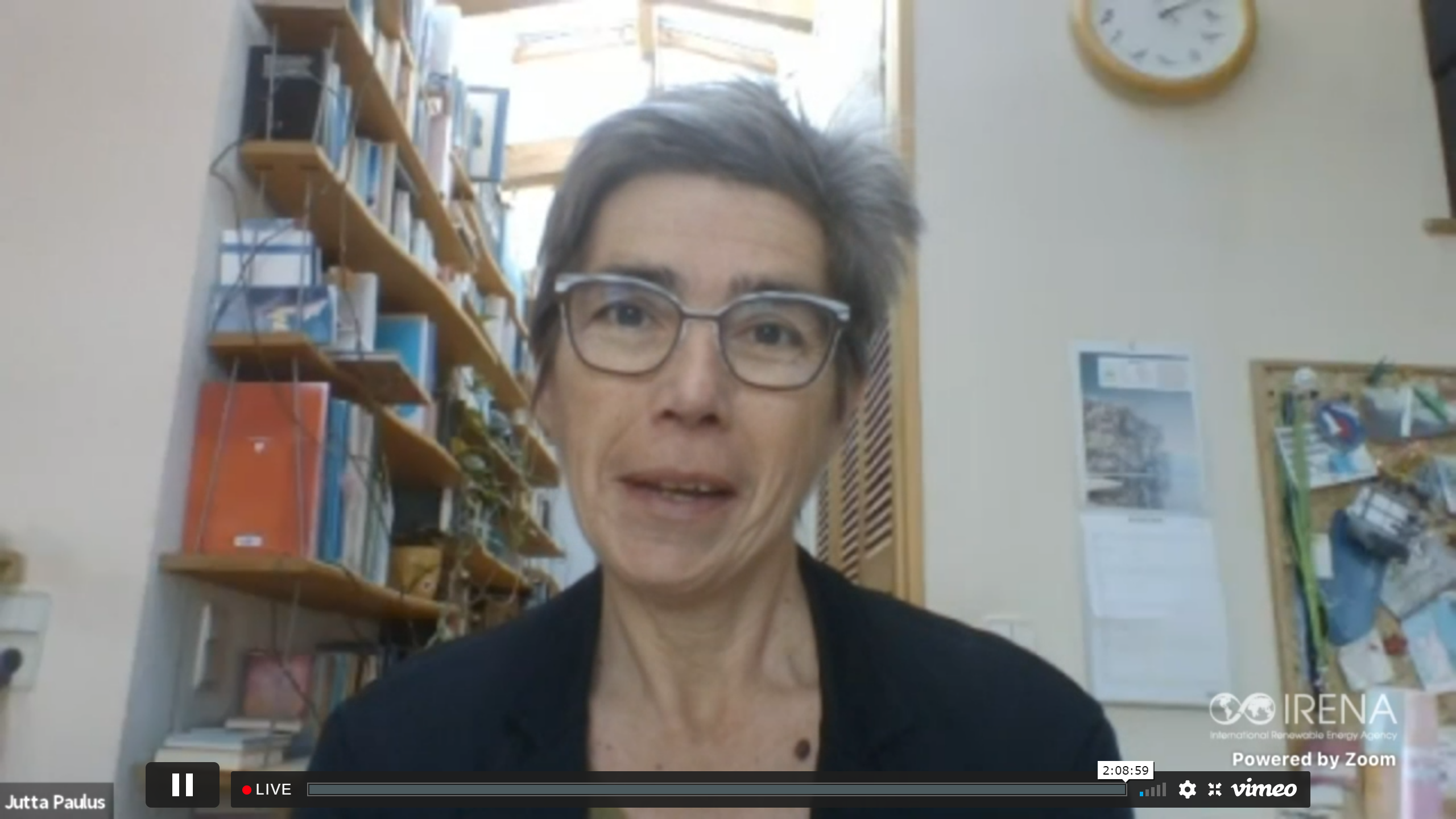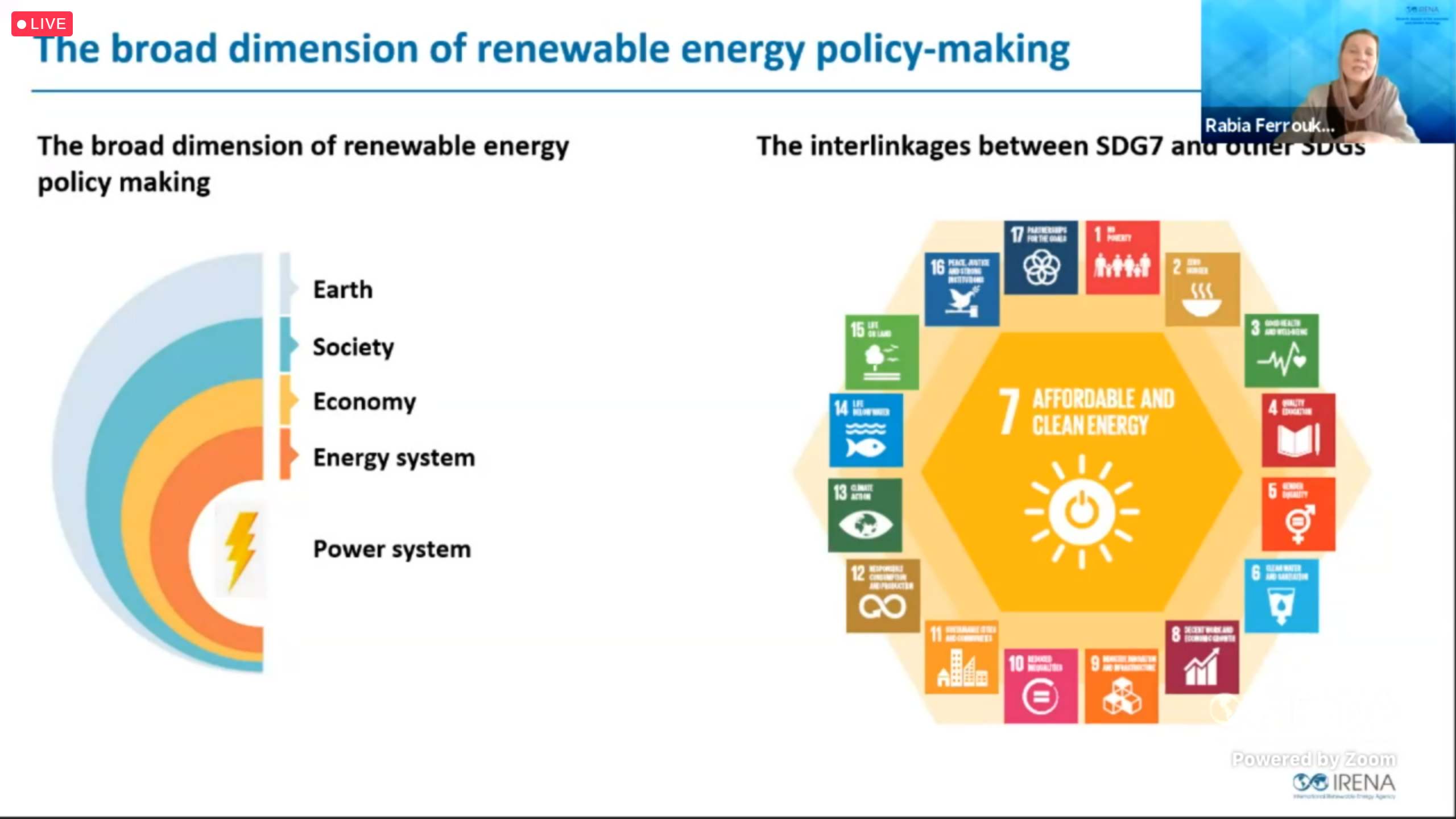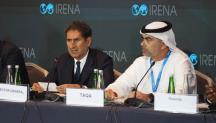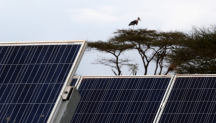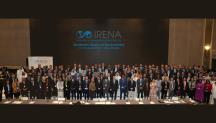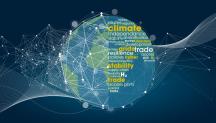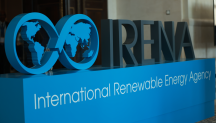

IRENA Pre-Assembly Live Coverage
Newsletter
IRENA Pre-Assembly – Day 1: Watch on demand
Legislators Forum – Parliamentary actions to scale up renewable investments: Renewable energy as an enabler of services
UN High-level Dialogue on Energy: Accelerating progress towards universal energy access and net-zero emissions
IRENA Pre-Assembly – Day 2: Watch on demand
Public-Private Dialogue COVID-19 as a game-changer: Actions needed to accelerate the pace of the energy transition
Youth Forum: Promoting an Inclusive and Just Energy Transition
The live blog below provides a rolling coverage of the Pre-Assembly Events as they happened.
The 2nd Youth Forum came to a close. The discussion was vivid and interesting, and touched on many important aspects of building a healthy, sustainable future for all, encouraging the Youth to be the part of this process early on.
Esta Wanza advocates for a greater presence of renewable energy education in the African region, saying that by working towards an increased level of education on renewable energy and climate issues and building these topics into national curricular, we can help young African people become more engaged in these issues. Hon. Kandeh Yumkela wholeheartedly agreed.
Mr Miguel Arias Cañete, the Former EU Commissioner for Climate Action and Energy outlined that it is not easy for developed countries to make the energy transition just, it is not easy to decarbonise and fulfil the Paris Agreement commitments. Yet, "technology will evolve, renewables are cheaper every day and it is marking the end of fossil fuels era," he stated.
"Renewables are going to be the energy of the future (...) the energy transition will only happen with the full support of the population," he concluded inviting Youth to be active actors in the transition to a clean energy future.
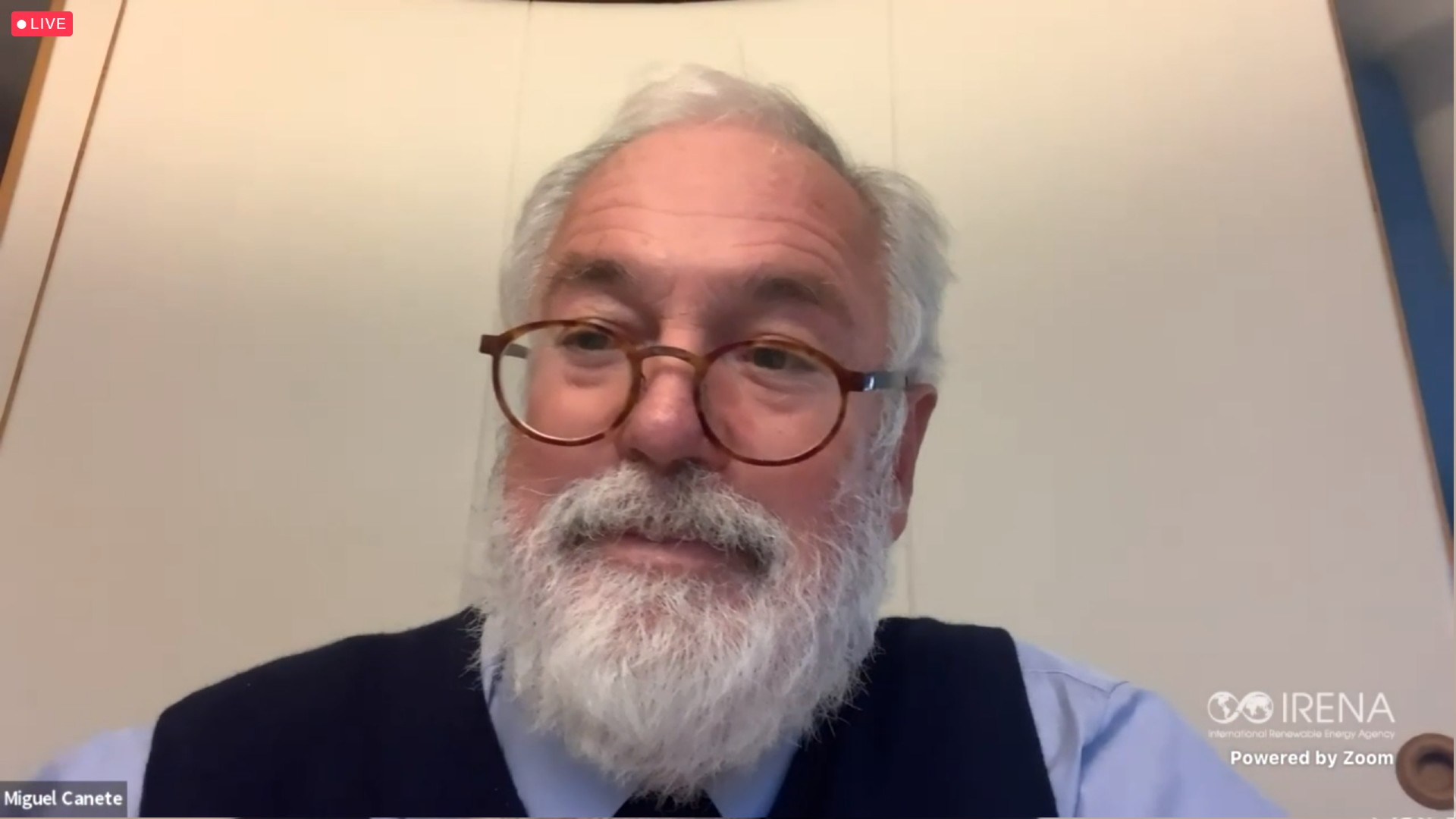
Hon. Kandeh Yumkela continued addressing the findings from the working groups, including education, healthcare and energy transition. He added that for most countries around the world there is a need for energy services along the supply chain to bring produced food to the community. Therefore, future energy entrepreneurship is critical to create a sustainable future.
Dr Maria Neira spoke about the need for decentralised energy solutions to solve energy access issues, especially in the context of healthcare. Accelerated, healthy energy transition is crucial, she stated. "We now realise even more how vulnerable we are and how access to clean energy is key to reduce air pollution and improve our health."
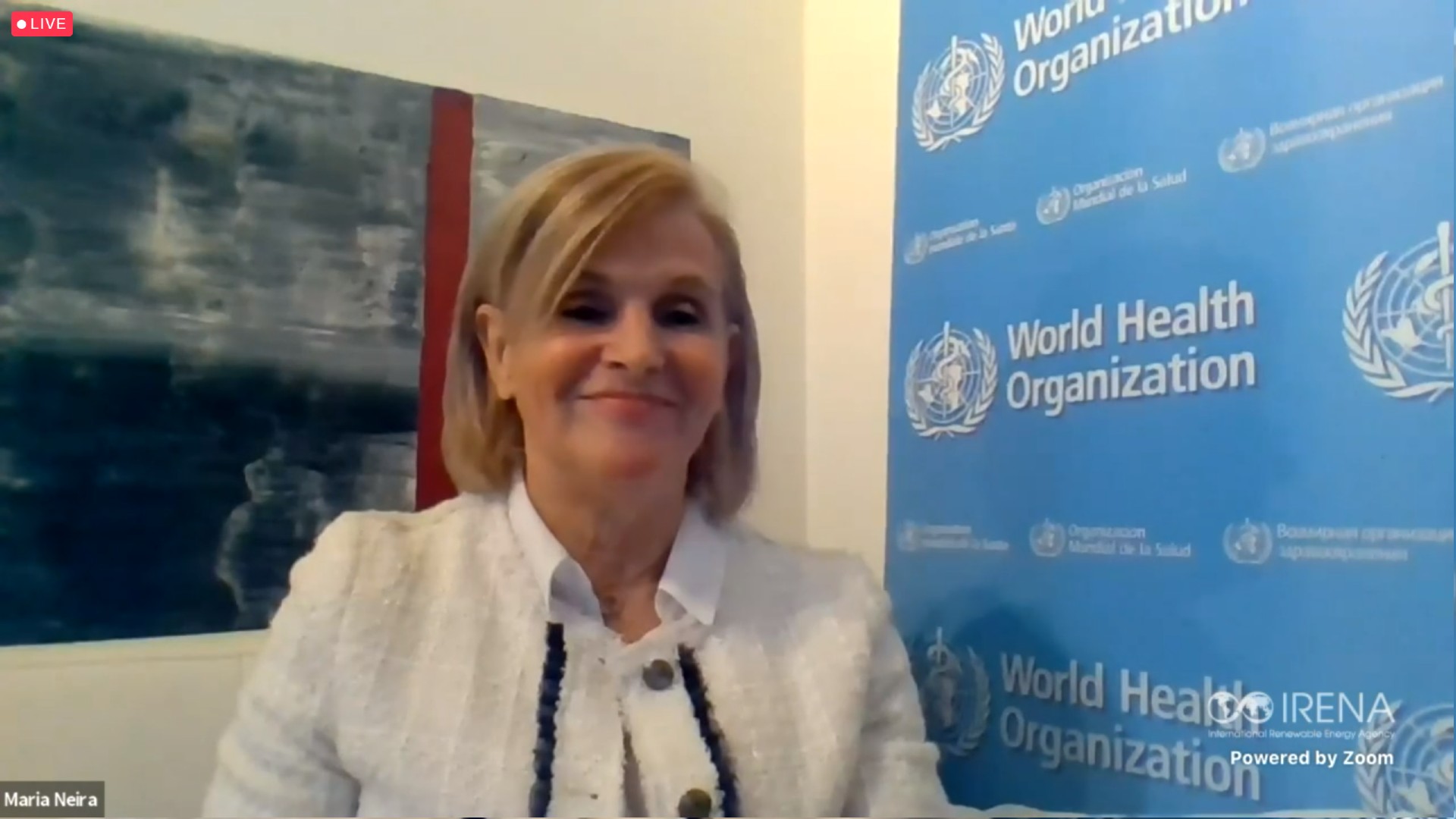
Ms Ditte Juul Jørgensen, Director General at Directorate-General Energy, European Commission says the world has a responsibility to find solutions for different parts of the world where the energy transition is particularly challenging. She adds that her hope is some of the things being done in Europe can benefit other countries when trying to apply similar approaches.
"We the Youth identified innovation, education and work experience as key to enable the participation of the youth in the renewable energy sector," says Vrinda Das from India delivering her speech about the outcomes of the second thematic working group of the IRENA Youth Forum. She concluded with an open call to all governments to create more opportunities by investing in the Youth and empowering the Youth with education.
Watch a quick recap of insightful IRENA Youth Video contest entries:
Lydia Sanz Lozano from Spain but resident of the UAE says renewables presents themselves as a solution to overcome our greatest challenges, stressing that renewables are the key and we need to harness their power. She concludes by saying, “We are the future generation. Dream, persevere and stay positive. Then you will be able to make your ambitions a reality.”
Next, Ms Cherop Soy from Kenya, from the 2020 IRENA Youth Forum offers an overview of achievements after the 2020 Youth Forum and outlines how she has taken advantage of the Forum to pursue opportunities and set new goals, for herself and her your community.
"As Youth you will always have a role to play in energy transition," reassures His Excellency Bachir Ismael Ouedraogo, Minister of Energy of Burkina Faso, welcoming the event participants. "You as young people are the world's future leaders but you must start today," he says encouraging Youth to share their fresh perspective and innovative ideas which are of quite importance to international community.
In his opening remarks, IRENA Director-General, Francesco La Camera welcomed the Youth and the high-level event participants: Maria Neira, Director of Public Health and Environment at the World Health Organisation, Ditte Juul Jørgensen, Director for Energy at the European Commission, Kandeh Yumkella, Member of the Parliament from Sierra Leone, and Miguel Arias Cañete, Former EU Commissioner for Climate Action and Energy. Mr La Camera continued outlining the context of today's meeting in the times of pandemic.
"For IRENA, the recovery needs to be an inflection point for energy. We need an energy system fit for the 21st century; one that promotes resilience, development and equality. (...) The energy transition offers immense opportunities. We must make sure that this transition is inclusive and its benefits – such as job creation, clean air and new industrial development opportunities – are shared widely and equitably," he concluded.
Soon to start, the 2021 IRENA Youth Forum aims to engage youth from all over world with discussions on the challenges and opportunities of this year’s theme: ‘Promoting an Inclusive and Just Energy Transition’. The Forum provides an opportunity for participants to engage in discussions on the deployment of the promotion of an inclusive and just global energy transition.
The forum aims to provide the existing network of young energy leaders with the latest insights from the renewable sector, and connect young people with global thought leaders, government representatives, and IRENA experts in identifying the space that exists for youth to contribute to the deployment of renewable energy and promotion of energy transition in the context of equity and equality.
Thanking everyone for their participation, the moderator invited Mr. Francesco La Camera, who closed the Public-Private Dialogue with IRENA’s reaffirmed commitment to continue working closely with all stakeholders on the road to a sustainable energy future. The pandemic has indeed become an accelerator of energy transition. The IRENA Director-General is convinced that the upcoming Assembly will be able to provide a platform for governments and the energy industry to take decisions on actions that set the course for a climate-safe economic recovery, in line with the objectives of the Paris Agreement and the 2030 Agenda for Sustainable Development.
The floor is now open for general interventions by lead discussants, who offer their views on what governments and the energy industry need to do to move towards just and inclusive energy transitions.
Another intervention came from Hon. So Yuk Choy, Hong Kong Deputy, National People's Congress, China. She empasizes China's recently announced commitment to achieve climate neutrality by 2060. But the pandemic shows that China can not pursue a global challenge alone, all nations in the world should join hands in achieving the shared goal.
"Pandemic is indeed a signal to speed up," says Lamberto Dai Pra', Head of Power Generation Africa, Asia & Oceania, Enel Green Power. But what is needed for the transition to take up speed is project facilitation, capacity building, bankable projects to invest in, he concludes.
Read IRENA's report offering practical advice on key investment and policy decisions for the crucial post-COVID recovery Post-COVID recovery: An agenda for resilience, development and equality.
Norbert Gorissen, Deputy Director-General, German Federal Ministry for the Environment, Nature Conservation, Building and Nuclear Safety outlines steps to green recovery. He speaks of drawbacks of continued investment in fossil fuels as it will not reduce our resilience. "Climate crisis has to be addressed," he states. Clear mid- and long-term goals and ambitions are crucial to allow for necessary investments. These goals cannot be only set, they need to be implemented. He adds that an inclusive and fair decision making process, and full engagement of all stakeholders are vital for a just transition.
The General Secretary of the International Trade Union Confederation, Sharan Burrow, said that governments and industry should address workers’ concerns in achieving a just transition by strengthening partnership. There should be a climate-friendly jobs plan, as we want this transition to be inclusive. There are some key learnings that governments and industry should bear in mind; give hope and support to the workforce, make the commitment, and have the dialogues with people in the job sector.
At #IRENA11A Public-Private Dialogue, @World_Bioenergy Executive Director Bharadwaj Kummamuru stresses on the importance of the right regulatory and political framework, including feed-in-tariffs, reducing subsidies for #fossilfuels and putting a price on carbon. pic.twitter.com/Stqltehx1C
— IRENA (@IRENA) January 14, 2021
The discussion is continuing. Barry Gardiner, Member of the UK Parliament said that since the UK government holds the COP26 presidency, there seems to be high expectation that the UK is leading in terms of climate ambition. He underlined that the UK is committed to a net-zero economy by 2050 and renewable electricity can help to meet that ambition. Also hydrogen will play a vital role in decarbonising the hard to abate sectors, he added. UK is currently investing into green hydrogen development, hoping to accelerate the race to net zero.
IRENA analysed countries’ nationally determined contributions (NDCs) based on new pledges submitted in December 2020, see Renewable energy and climate pledges: Five years after the Paris Agreement.
Iberdrola’s Director of Climate Change, Gonzalo Sáenz de Miera, is convinced that a fully decarbonised energy sector is possible, as long as governments and industry work hand-in-hand to make the energy transition happen. He is convinced that green hydrogen is playing a very important role in making renewable energy solutions even more competitive. Iberdrola just announced a 800MW project to produce green hydrogen, and the investment will create jobs in the sector.
The second session now begins, with the objective to provide insights on how public and private actors are revisiting their recovery and investment plans, as well as to identify what is needed ahead by governments and the energy industry to accelerate the pace of the energy transition. Panellists coming from the Coalition for Action membership offer their views on how COVID19 has emerged as a game changer for the entire energy industry, and how governments can grab the opportunity to speed up energy transition based on renewables.
The Coalition for Action members have put forward a renewed Call to Action last December, urging to correct course for a green recovery and accelerate progress towards Paris Agreement. Read the recommendations and watch the video below:
Giving the last intervention in the first session, Bharadwaj Kummamuru, the Executive Director of World Bioenergy Association, said that biomass, biofuels and biogas have fared quite well during the pandemic. What lies ahead for bioenergy sector is still too early to be identified, but there is already good news with new technologies, that allow the bioenergy sector to expand the market. “If there is anything I would like to convey to the governments, to prioritise on carbon pricing,” he underlined.
Eddie Rich, CEO of International Hydropower Association offers his views on the future of hydropower industry post-COVID-19. The pandemic has highlighted hydropower’s role in delivering clean and reliable energy, he explains. "In 2021 there is no excuse for hydropower development to meet at least the basic requirements of sustainability. (...) We are urging governments across the world to start planning now for the flexible grids of the future that will support flexible solutions, like hydropower," he concluded.
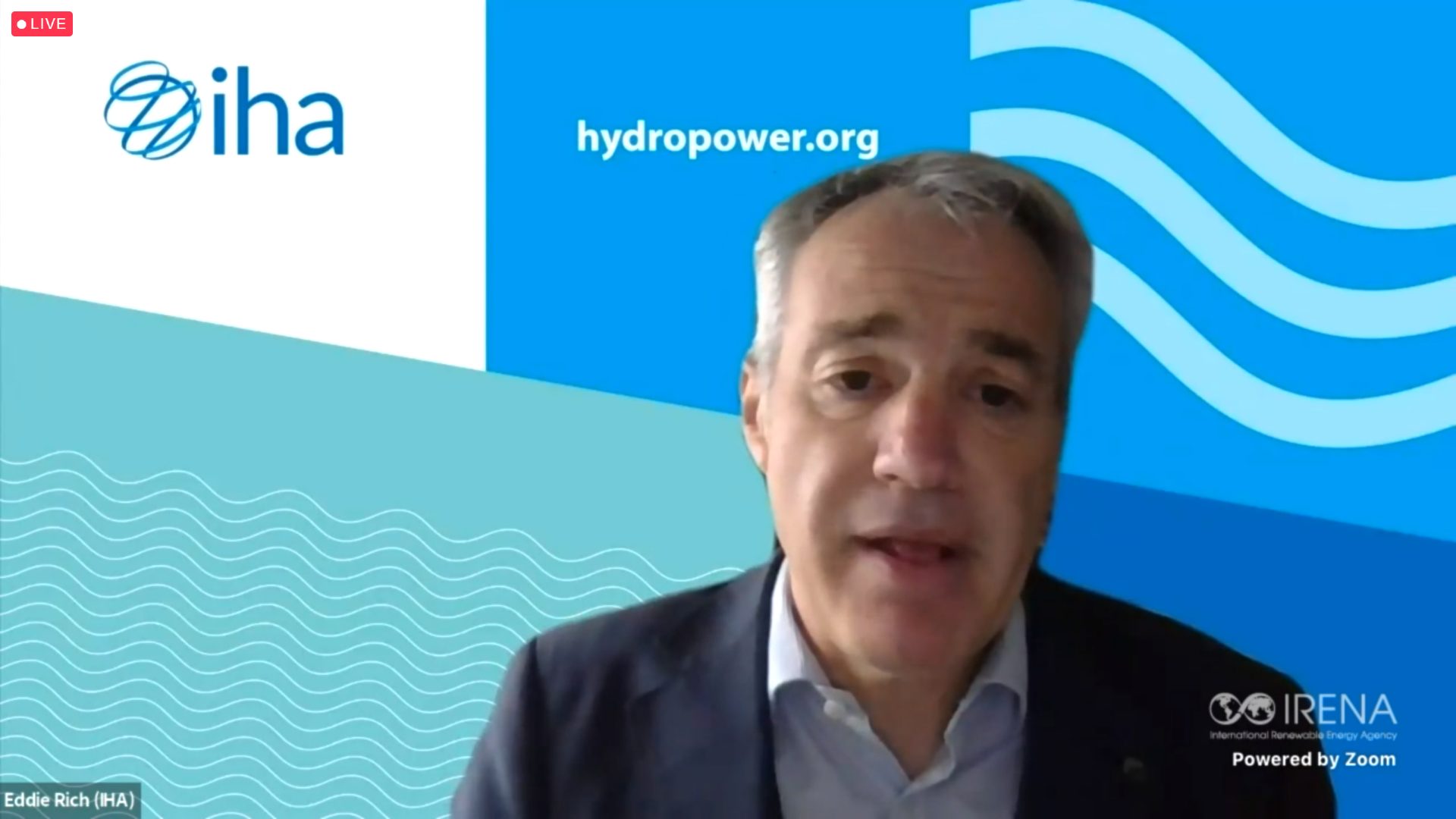
Ben Backwell, CEO of the Global Wind Energy Council, shared his views on how the wind industry bounced back from crisis caused by the pandemic, and how wind can contribute to accelerating the energy transition. The wind power industry is convinced of the sector’s capacity, but there must be project pipelines to drive the growth further. "The problem today is not a lack of money. The problem is not enough projects that are bankable to allow to invest this money at a speed we want to be going with," he stated, concluding that this is where the market needs the support of governments.
The first session has now begun. In this session, leading renewable industry associations from across the Coalition membership will present COVID19 impacts and responses to date, including their outlook on the energy transition and broader climate objectives.
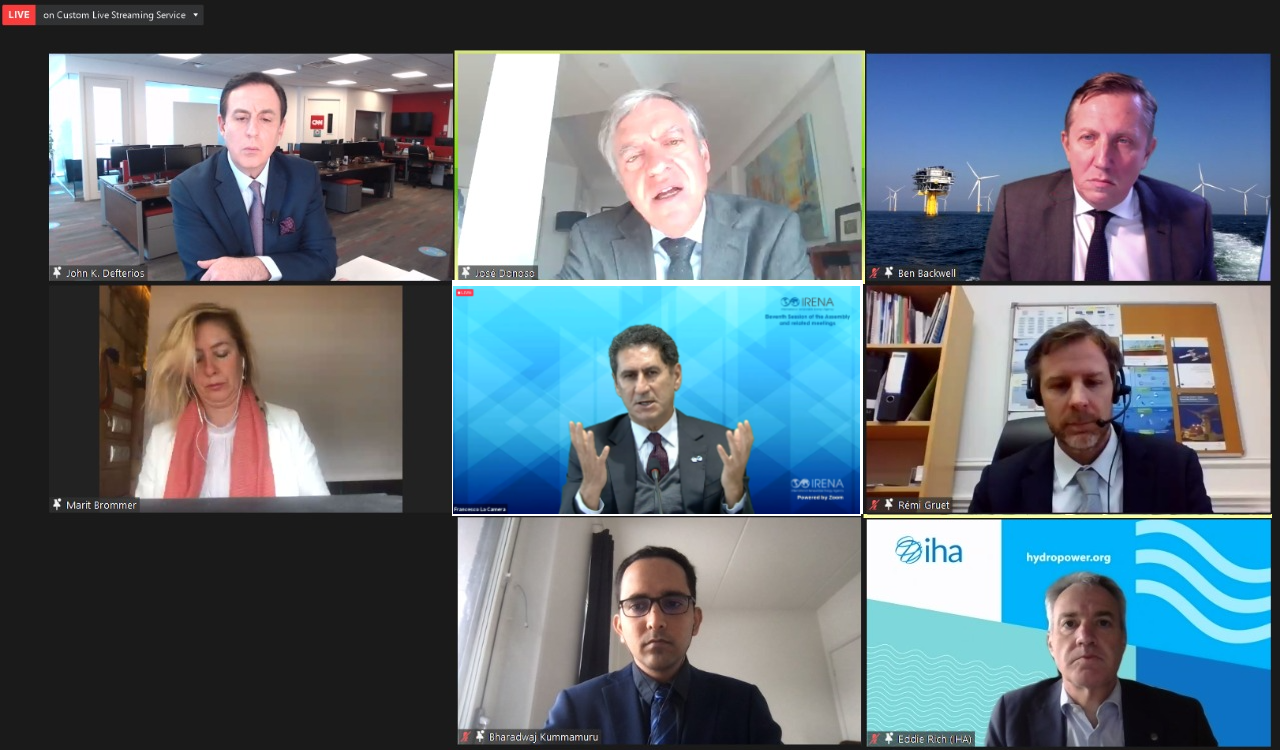
The first intervention was given by José Donoso, Chair of Global Solar Council, who explained how COVID-19 has altered the trajectory of the solar energy industry. “The industry needs government’s support through policy that attracts investments. Reduced bureaucracy must also be a priority to ensure the stability of solar power industry,” he said.
Mr. Kingsmill Bond, the Energy Strategist of Carbon Tracker Initiative, a member of IRENA Coalition for Action, opened the session with a scene-setting presentation. He showed how renewable energy emerged as a key player in filling in the gap made by the failing fossil fuels sector during COVID19. With continuous decline of costs, renewable energy proves its resilience, propelling a policy reset. More countries and companies announced their net-zero commitments. Investors are also tapping on the momentum, making the period of COVID19 a game changer for energy transition.
"2020 was the year when investors really woke up to what was happening (...) a decline for fossil fuels and rise for renewables. (...) Now it is the moment to cease the opportunity and bring clean energy to your people," he concluded.
IRENA Director-General, Francesco La Camera, gave his introductory remarks by emphasising the importance of partnership between government representatives, legislators, the private sector and civil society in accelerating global progress to drive the energy transition based on renewable energy. The Director-general acknowledges the great role of Coalition for Action members’ perspectives on actions on the ground. It is encouraging to see fossil fuels industry players starting to shift towards clean energy transition. COVID-19 has indeed become a game changer in our energy system.
"IRENA’s post-COVID recovery agenda calls for an accelerated uptake of renewables, energy efficiency and energy access, to spur economic recovery while driving sustainable development in line with global climate objectives," he stated.
Public-Private Dialogue on COVID-19 as a game-changer: Actions needed to accelerate the pace of the energy transition is about to start.
The Public-Private Dialogue serves as a key platform for policy makers, legislators, industry associations, private sector stakeholders and civil society to exchange views on the latest renewable energy trends. Building on two Calls to Action from the IRENA Coalition for Action for governments and legislators to deliver on a green recovery, this year’s edition of the Public-Private Dialogue will focus on the actions needed ahead to accelerate the pace of the energy transition.Pradeep Kurukulasuriya, @UNDP's Director for Nature, Climate & Energy finds it offensive that millions of people still lack access to #energy. Stepped up actions need to be taken very quickly without delay, as we have less than 9 years to achieve #SDG7.#IRENA11A pic.twitter.com/aHlqEHX30T
— IRENA (@IRENA) January 13, 2021
Mr. Minoru Takada, UNDESA has summarized the discussion: "We heard a lot of ambitions and opportunities but there is an urgency to act together."
Ms. Safiatou Alzouma Nouhou, Director of the Independent Delivery Unit, AREI has outlined key areas of focus for the realisation of SDG7, including focus on supporting the effort of countries and regions through providing regulatory support and essential framework for attracting private and public investments. In addition, project facilitation support, in the form of capacity building, assistance and project financing and funding support is crucial, she underlined. "The scale of energy challenges are enormous, but so are the opportunities," she stated.
The panel discussion on Leveraging the UN High Level Dialogue on Energy for accelerating action is now continuing. Moderated by Mr. Minoru Takada, UNDESA, and opened by H.E. Dr. Nawal Al-Hosany, Permanent Representative of the UAE to IRENA, the discussion focuses on the importance of energy in achieving the SDG goals.
Mr. Marcel Alers, Head of Energy at UNDP offered the full support to the initiative, saying: "We are present in many developing countries, and we can use the knowledge we have on the local level and help to achieve progress. The political (...) is the one ingredient that can make other things go forward." He continued saying scale-up of productive efforts is required to be successful now, when there is less than 10 years to go to achieve the goals.
In her keynote presentation Ms Damilola Ogunbiyi, Special Representative of the Secretary-General for Sustainable Energy for All, UN-Energy Co-Chair & Dialogue Co-Chair, provided an overview of the roles and responsibilities of the working groups and the plans going forward.
The second session of the day has just begun.
The Secretary-General of the United Nations will convene a High-level Dialogue on Energy at the Summit-level, during the UN General Assembly in New York in September 2021. The Dialogue presents a historic opportunity for all stakeholders to come together and accelerate progress towards decarbonised energy systems with universal energy access. In order to draw on a broad range of expertise and perspectives during the preparations for the Dialogue, a multi-stakeholder Technical Working Group will be established under each Theme to advance in-depth discussions.
Today’s side-event, UN High-level Dialogue on Energy 2021: Accelerating progress towards universal energy access and net-zero emissions, will present the overview of the High-level Dialogue on Energy 2021, and highlight the work ahead, with a focus on the planned activities of the Technical Working Groups.
Parliamentarians strive to accelerate the #energytransition & realise health, welfare and economic benefits for their constituents. I wish to thank participants of today’s Legislator Forum for using their power to scale up investments & advance renewables on the ground. #IRENA11A https://t.co/1r0XdjecUL
— Francesco La Camera (@flacamera) January 13, 2021
The Legislators Forum is coming to an end. Mr Yumkella summarizes the discussion outlining key points on investment in the green recovery and energy transition.
We need renewable energy solutions to ensure health services work well, to ensure jobs and sustainable economic recovery, he concluded. "What we also need is private sector engagement. We need the real actors to come in (...) Getting the private and public capital working together is key."
Parliamentarians are now discussing common barriers for bringing in investments in renewable energy into their countries and the opportunities the just transition will bring for all.
The Coalition for Action has published a set of country papers on Scaling-up renewable energy investments. Available now: Algeria, Colombia, Jordan, Mexico, Tunisia and Viet Nam.
"It’s important to look at the role of MPs in promoting #renewables. Parliamentarians can raise the ambition & accelerate national legislation needed to meet #ParisAgreement decarbonisation objectives." underlines Nick Dunlop, SG of @ClimateParl - at Legislator Forum.#IRENA11A pic.twitter.com/6S320Fy6O6
— IRENA (@IRENA) January 13, 2021
Sven Clement, Member of Parliament, Luxembourg talked about potential solutions for locating funds for investments. "We need to show that investments into renewables instead of fossils fuels will yield better results (...) I'm certain we can mobilise the capital and the knowledge to put it into making it happen". He also underlined that the governments need to ensure guarantees that assets will not be lost, by putting in place safeguards to guarantee returns on investment.
First of the panelists, Jutta Paulus, Member of the European Parliament, summarizes Germany's experience with passing the law supporting renewable energy deployment in the country, and how the mass positive reaction of the society and private consumer investments influenced the price reductions of solar panels, making renewables cost-competitive today.
Adam Bruce provides an overview of best practices for just energy transition to renewable energy. "There is no shortage of capital and investors are increasingly aware of high risks of stranded assets associated with investment in coal," he said. "Yet, we need new regulatory structures which would encourage these investments."
The scene setting presentations for this panel are provided by Ahmed Badr, Acting Director, Project Facilitation and Support, IRENA and Adam Bruce, Global Head of Corporate Affairs, Mainstream Renewable Power. Mr Badr provided an overview of the renewable energy finance and benefits the investments in renewables can bring. "Transition will benefit considerably from the support of Parliamentarians," he said. He also showcased new IRENA initiatives on project facilitation, focusing on the global goal of matching investors with investment-ready projects, including Climate Investment Platform initiative and IRENA's work on the three main workstreams, including market place, financial de-risking and NDC-related activities.
Read the latest IRENA analysis:
The floor is now open for comments. The Parliamentarians discuss potential for actions that can be taken during the post-COVID recovery phase to accelerate the deployment of renewables. They also touch on challenges they are facing in energy transformation, including limited access to energy, issues of funding in developing countries, barriers to fast implementation.
Read IRENA analysis on Post-COVID recovery: An agenda for resilience, development and equality
In the last intervention of this session, Bärbel Höhn, Chair, Global Renewables Congress said that more countries decided for renewables because renewables are independent from disruptions of supply chains, so often experienced during the pandemic. The governments also noticed that renewables and cheaper and easier to implement than fossil fuels. In addition, renewables create jobs, especially local jobs which is of great importance to developing countries, in particular. "Renewables help to overcome hunger and poverty," she concluded providing multiple examples of sector coupling for economic and social gains.
Yiorgos Loukaides, Member of Parliament, Cyprus speaks of the country's goals to shift to renewables.
In her intervention, Ibtissame Azzaoui, Member of Parliament, Morocco spoke about how regional and country lockdowns have changed behaviors, and in result these changes may have long-term impacts, both positive or negative, on energy transformation. She underlined that opportunities to accelerate energy investments under post-COVID recovery agenda can stimulate jobs growth and economic development. She progressed to underline the role Parliamentarians play in promoting renewable energy use after this health crisis comes to an end.
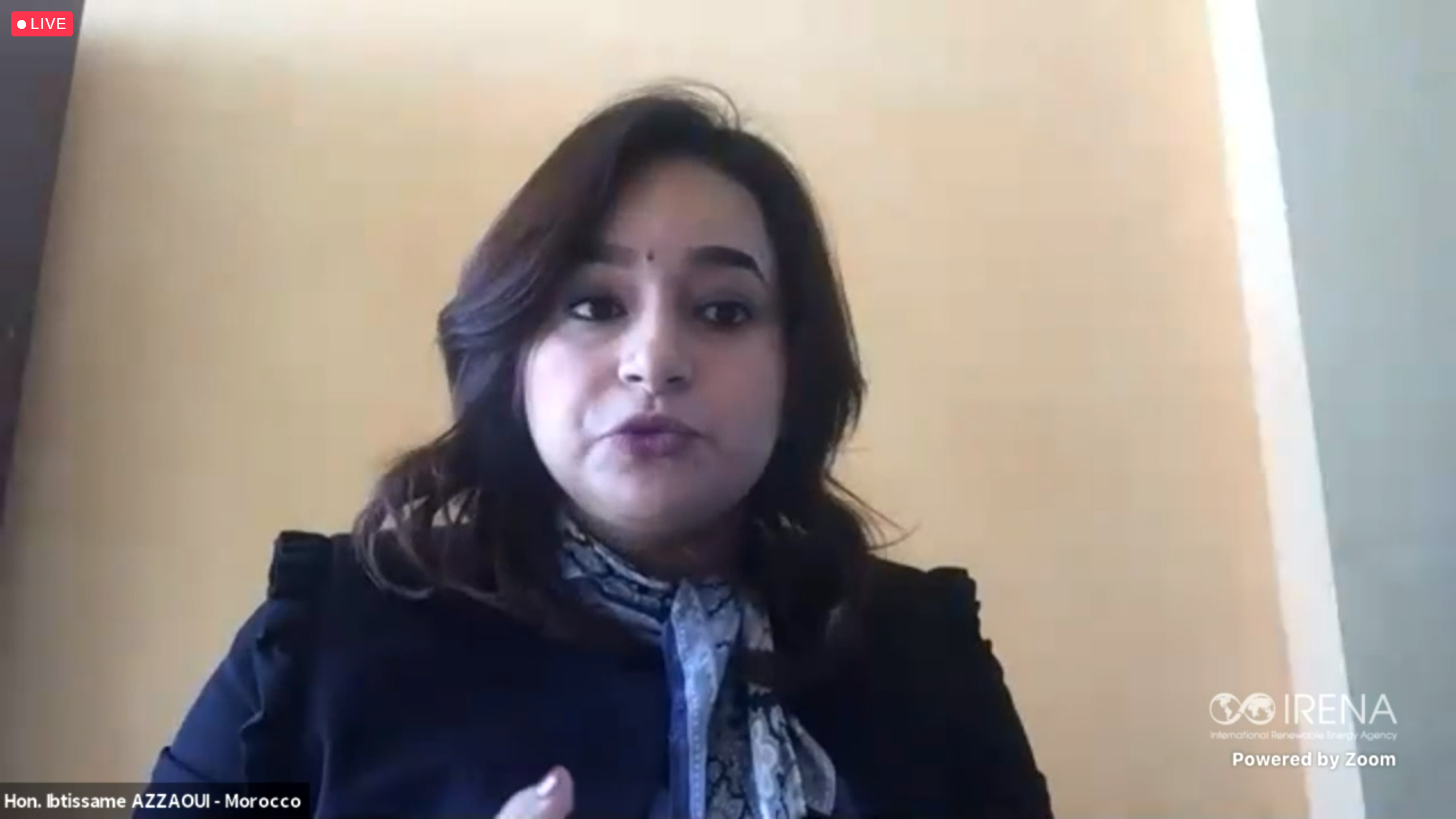
The first discussion is soon to begin. The scene setting presentation by Rabia Ferroukhi, Director, Knowledge Finance and Policy Center, IRENA provided key background data and overview of key actions necessary for a smooth energy transitions for post-pandemic recovery. A holistic policy framework and broad systemic changes which would support the green recovery are crucial, she said. "Complete transformation of energy systems will have ripple effects across sectors. (...) Now is the best time to act to overcome the current economic downturn."
